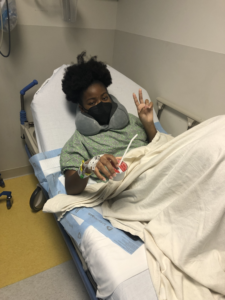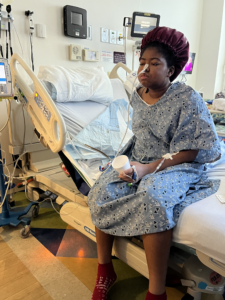The First Signs and the First Dismissal
Picture this. You’re a 17-year-old girl who hasn’t been back to in-person school since March of 2020, during your sophomore year of high school. While most of your peers returned after the initial COVID-19 outbreak, you did not. And now it’s August of 2021, and you’re excited to make your big return for senior year. But something is off. You’ve had what you think is “food poisoning” for the past month. One day, you were fine, and then suddenly, eating hurts, and you’re going to the restroom up to 8 times a day with blood. You’re lightheaded, tired, and always so hungry until there’s actually food in front of you. To avoid getting too sick at school, you skip breakfast, eat a bit of yogurt at lunch, and then try – but fail– to eat dinner each night. Even so, your days are spent in the nurse’s office or your home’s bathroom. You look in the mirror and realize you’re starting to look a little… different, which is weird because the urgent care lab work came back clear.
A month struggling through school goes by, and you finally decide to see your primary care provider. You turn your phone to show her a picture of your most concerning symptom: the blood. Her eyes begin to water. She’s known you since you were a baby, and what you’ve shown her now is enough to bring tears to her eyes. This is a moment one would remember forever, and remember it I do indeed. She referred me to the nearest children’s hospital, which was just across the state line in Georgia. I counted down the days, hopeful that this would be the long-awaited relief that I prayed for. I wish that had been the case. When I arrived at the appointment, I was told that “he” wanted an X-ray.
A Feeling I Won’t Forget
I was confused about what an X-ray would do for gastrointestinal issues, but doctors know best, so I listened. Doctors know best, so I trusted them. After the x-ray and further discussion with the nurse, the doctor enters. Within what feels like less than 10 minutes, he glanced at the X-ray results and explained that I’m “packed with poop” and that “teenage anxiety” must be the cause. “But…I was excited about school when I started feeling this way,” I tried to explain. But he seemed so firm in his decision that it didn’t feel like there was room for any other possibility.
There was no space for my experience. He seemed so sure of his decision and dismissive of my insight that the “proof pictures” I had come to my appointment with remained unseen. Despite the talk of rectal bleeding for two months, loss of appetite, diarrhea, weakness, lightheadedness, and hours in the restroom, he concluded that constipation was the root cause rather than another symptom. And the solution he proposed? Two laxatives, with dosages scheduled three times a day for the next two weeks. “That’s it?” I thought to myself. By then, I felt embarrassed and had been made to feel like my mom and I’s presence in a specialist’s office was an overreaction on my part. This is a feeling I will never forget. My issues didn’t feel so simple, but he said they were. And he’s the specialist, so we listened. He’s the specialist, so we trusted.
“He Doesn’t Want Her Missing School Over This”
Immediately upon following his advice, my condition worsened. I became so ill that I was no longer able to go to school. I was now going to the bathroom up to 15 times a day with large amounts of blood, struggling to eat or drink, throwing up, passing out, and eventually, struggling to walk. We contacted the office of the doctor I was placed with and pleaded for help. We complained that my condition worsened and were told that things would get better after I stopped my laxative regimen. When we asked for the paperwork needed to qualify me as “hospital homebound” for school, we were told, “he doesn’t want her missing school over this.” “This,” as if my pain and what I was experiencing were a minor issue, only being amplified by me to stay out of school. About a month passed, and so did about 25 pounds of my weight. After the constant pleas of my mom, we were scheduled with a different gastroenterologist (GI) for a colonoscopy and endoscopy, a week out, on September 28th.
I had become so ill that it felt like a race against time between the life I had left in me and when this procedure would finally arrive. The days leading up to it were the hardest, and the necessary preparation process for the procedure complicated this. If anything had become clear at this point, it was that anything I put into my body was going to find a forceful way out, one way or another. Desperate, we informed this new GI of my struggles, and with the sounds of her own young children in the background, she comforted my mother and sent over a prescription for a nausea medication. Even after hours, her dedication was the only thing that enabled me not only to complete the prep but also to enjoy a bit of food finally. The morning of my procedure, I struggled to walk the long halls of the hospital. My mom and I had to take multiple breaks, just to let me catch my breath. And when I was finally settled in the preparation room, a time came when they needed to collect a urine sample. As a result, a striking truth became clear. I hadn’t been peeing much lately. And I couldn’t now. Quickly adapting, the nurses reassured us that it was okay because they could take blood as a way to do this standard testing as well. We awaited the results, and when they came back, everything changed.

An Overdue Diagnosis
“She can no longer have this procedure; her hemoglobin is too low, she’ll need blood,” said the nurse. I didn’t understand it at the time, but my hemoglobin had reached a deadly level of 5.2. The nurses pondered how I, a patient they were preparing to put under anesthesia, could be so anemic now, without previously taken blood work showing so. “He didn’t take blood work,” I nervously said. The tone in the room shifted, and an understanding that would only later dawn on me began to spread. “He,” my original GI, came into the room and sat in the corner, across from my frail and shaky body. “Did they tell you the news?” he asked with a blank expression.
My angry and confused mom replied, questioning how in the world I could have been so sick at this point, without even him knowing, despite being in his care for the past month. Despite our pleas, despite my symptoms, and my cries, he had not seen me as what I was, a sick child in need of further care. The feeling of betrayal and distrust washed over me. This feeling was something I will never forget, as it marked the maturing of my understanding that deserving or needing help is not all it takes to be considered worthy of preservation. And this is a reality that has shaped the healthcare experiences of people and patients who look like me for far too long. During a nine-day stay, I received blood transfusions, was nursed back to a livable standard of health, and was diagnosed with ulcerative pancolitis. My diagnosis meant that at that point, my entire large intestine was inflamed by the disease.

A New Doctor, Difficult Decisions, and Reclaiming Power
In contrast to the first GI, my new one always listened to me. Just like she was that day on the phone when she prescribed the medication, she continued to feel like my saving grace. Whenever I felt off and knew something was wrong, she provided the necessary lab work and was always willing to take a closer look. Though I struggled and accumulated over 140 class period absences, I graduated Summa Cum Laude, the highest honors group. From then on, my symptoms were relentless. In July 2022, I was hospitalized once again, needing another blood transfusion. My aggressive ulcerative colitis led me to make the tough decision to become an online student for my first year of college.
Although this was a heartbreaking decision, it proved to be necessary. The school year started, and I was once again hospitalized in September 2022, after my trips to the bathroom with blood had increased to 9-11 a day. And then, after only a brief period at home, I was hospitalized once again in October 2022. This time, things were different. Prednisone, Mesalamine, Entyvio, Humira, Infliximab, Stelara. These were the many treatments that I had tried yet continued to get worse on, and thus failed. Even with these treatments, the bleeding never entirely stopped. When I was hospitalized this time, once again needing a blood transfusion, it was with the understanding that this life would no longer be sustainable. So, with my team, we decided to move forward with a proctocolectomy and the placement of my ileostomy. After 12 days in the hospital, I was allowed to go home, and my life has been different ever since.

Why I Advocate
When I look back on my journey, it can be hard to cope with the understanding that not being believed allowed my disease to progress to a point that, evidently, I never was able to recover from. And ultimately, it landed me there, as an 18-year-old, and now a 20-year-old living with an ileostomy bag. Although I immediately felt better, I also felt unheard, underrepresented, and as though I deserved better than how I was treated and the cards I was dealt. From this, I’ve decided to reclaim my power and give myself and others like me a better life. I stand here now, and it’s been two years since I had my surgery. I recognize that as a black woman, my pain wasn’t seen as the same as that of my counterparts. I realize that as a black woman, I’m not proportionately represented in these patient spaces. Each day, I give “better” to myself and other patients by deciding to change that.
I share my story to show those in power that just as my inflammation didn’t wait, they shouldn’t either when it comes to uplifting and listening to the voices of patients. By sharing my story and advocating within the health space, I aim to empower patients like me to take back their power through self-advocacy. To know that no matter what the expert you face is telling you, only you are the expert on your own experience. I want to share my story so that in a space where I did not see “myself”, other black patients can see me and know that they deserve a voice and representation too.
I share my story and live boldly, loudly, and proudly with my ostomy so that after everything I’ve been through, I can finally give myself the peace and self-love that I deserve. And I hope that others will follow. I advocate for others because that 17-year-old girl didn’t yet know how to, and having those resources could’ve saved her a lot of pain. And I make this journey of self-advocacy public, so that others can join me and receive the access, support, and liberation that they deserve. When we see that there’s no space for us, we either change the space or create our own. As patients, we must give ourselves “better” by settling for nothing less than what we deserve and demanding more for both ourselves and our communities. This is my story, and therefore I advocate.
A missed diagnosis can leave lasting scars, not just on the body, but on trust itself. At the Infusion Access Foundation, we share these stories to raise awareness and ensure every patient is truly heard. Kagan Ellis wrote this story. The Infusion Access Foundation team edited this story.







